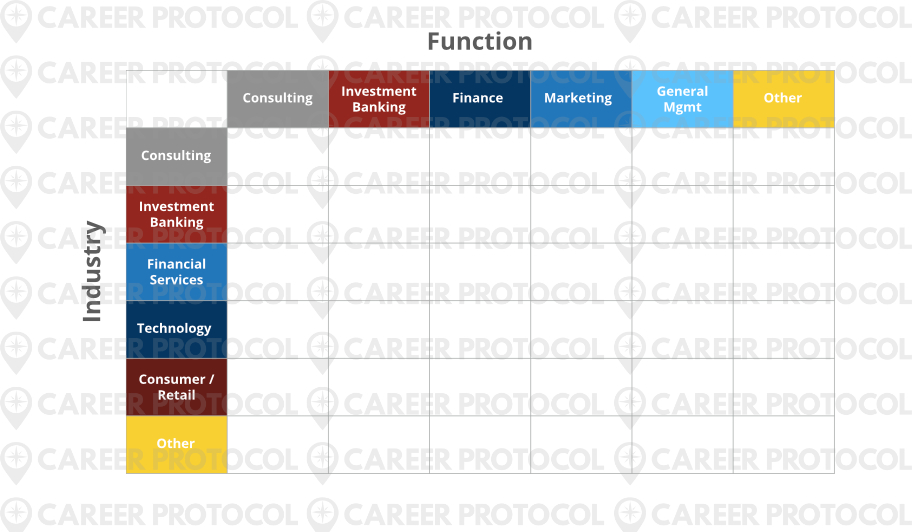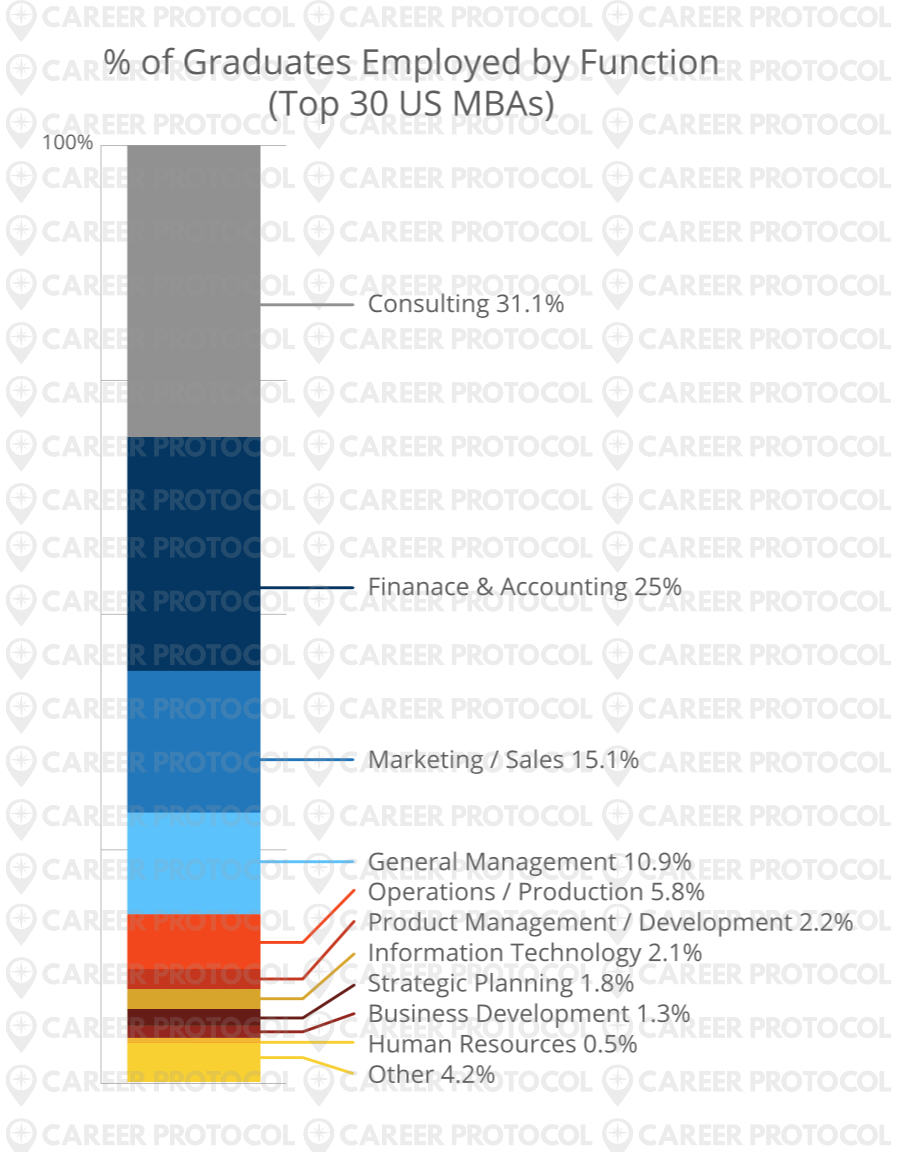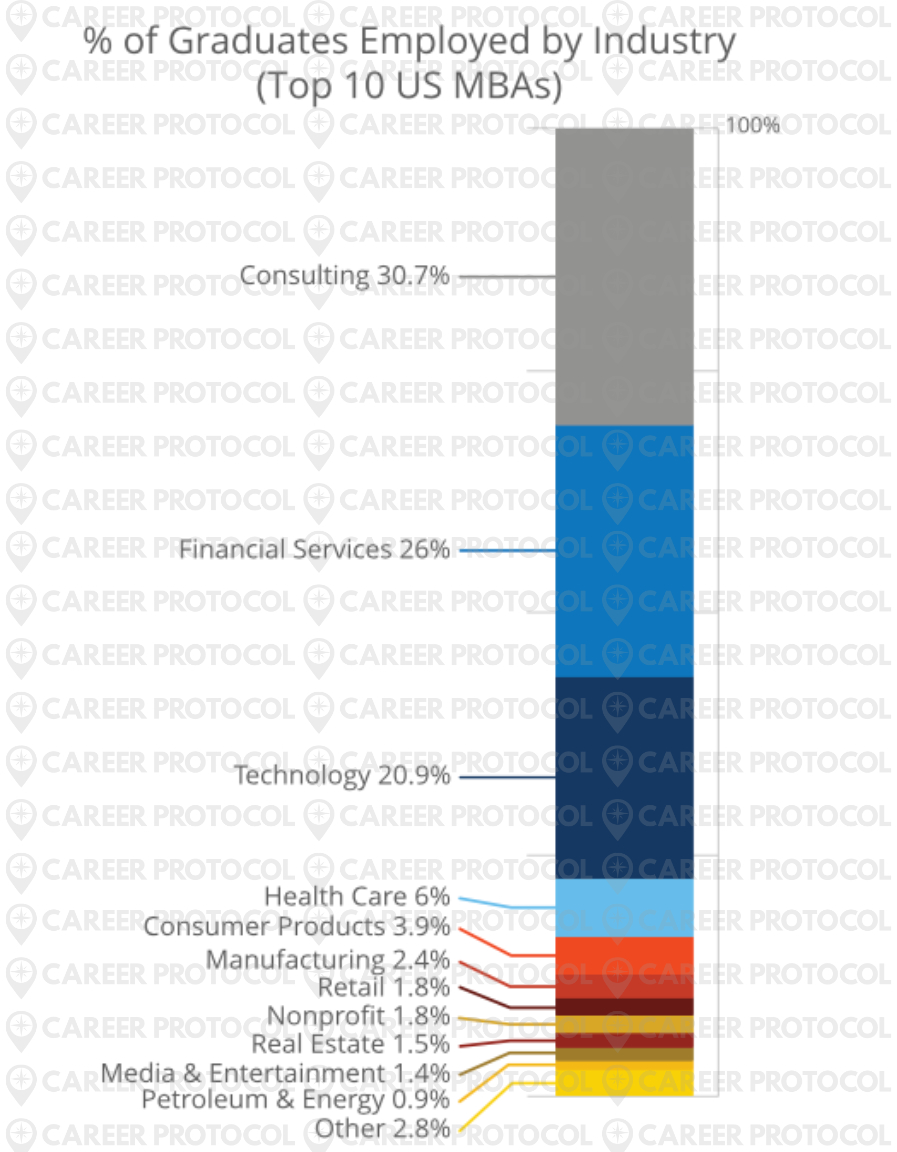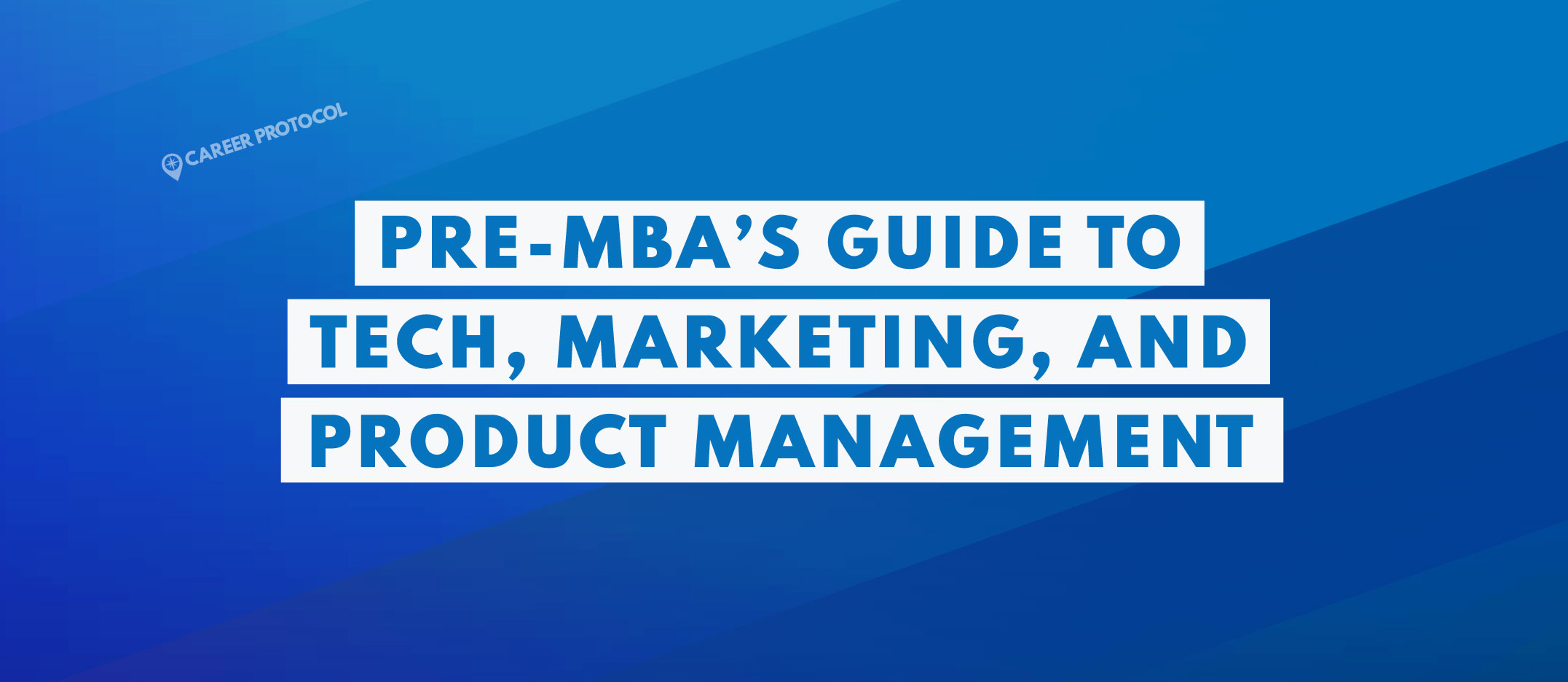
Get Instant Access to the Report!
Join our community and choose the Career Placement Report as your FREE premium welcome gift! It's over 120 pages of insight and analysis on placement and statistics at the top 30 schools.
The short answer is: it depends. Ha!
On what?
On you. Your goals. Your needs. And your constraints.
You need the MBA that's best for your career.

I'm Angela, Founder of Career Protocol and I made this whole company to help you build a career that matters.
For more info about how to home in on YOUR dream MBA, read on!
Table of Contents
The Best MBA Program: It's All Relative
There is no one best school for everyone no matter what the rankings try to claim.
Notice how the rankings don’t even agree on who’s the best!! Each publication has its own methodology and algorithm to determine which schools come out on top.
Financial Times ranks INSEAD #1
and Booth as the top American MBA program at #3
The Economist ranks IESE #1
and Ross as the top American MBA program at #3
Forbes ranks Booth #1
US News ranks Stanford GSB #1
Poets & Quants ranks Stanford GSB #1
Bloomberg Businessweek ranks Stanford GSB #1
And that’s just the 2021 rankings. Check back in a few months and you’ll see an entirely different school list. Maybe Bloomberg Businessweek gives schools the most points in the ranking equation for, say, highest average GMAT score at the school. (We actually don’t know how they rank schools – even rankings that publish their criteria and weighting do not publish granular data on individual schools, so it’s hard to make real sense of the rankings.)
But think about it. Do you personally really care how high your classmates’ GMATs are? Heck no! In fact, if someone came up to you and introduced himself and said: “HI, I’m George. I got a 740 on my GMAT.” You’d probably immediately cross him off your “potential new friends” list and politely skirt across the room.
The things that matter to you specifically aren’t the same things that matter to ranking agencies. The thing that matters to them is clicks and ad revenue. You’d be wise to remember that.
So if you’re about to spend $200,000 on this investment and give up two years of salary and work experience to better yourself, you’d better figure out which program is going to better YOU the most! And that school won’t be the same school for you as it is for someone else.
The MBA is personal. So to make a good choice you need to do three things:
Step 1: Understand yourself and what you really need from your MBA.
Step 2: Understand how competitive you are at the various programs.
Step 3: Understand what the schools actually offer.
Differentiating Among MBA Programs
I know, I know! All the schools seem amazing and pretty much the same based on their websites. How are you supposed to choose between Stern and Columbia? Or Darden and Tuck? How different are they, really?
Here’s why you need to look past the rankings and the stereotypes. We’ve had clients come to us absolutely set on a school, only to realize that that school doesn’t even offer what they’re looking for. It’s really easy to get caught up in the rankings, but you’ll want to make sure that once you’re there, the program is going to help you achieve your dreams. We talk about this at length with our clients, but this is why it’s so important to network with the schools early on in the process – to learn what they offer, what current students say about the program, and what opportunities in your industry of interest exist post-MBA.
But before you start asking questions, we want to arm you with all the information you need to know! Below, you’ll find data we compiled from the Placement Reports of the top 30 MBA programs for our awesome Career Report. We looked at where MBAs end up – which functions, which industries, and which companies – and sorted through it to make it really easy for you to start distinguishing between programs that seem similar. Keep reading to see what we found!
Industry and Function
The most common way to think about different career options is in terms of Industry and Function.
First, let’s talk industry.
Industry is about the company you work for and what it does – for instance, consumer packaged goods (CPG), oil & gas, and technology are three different industries. But there’s some additional nuance to consider too:
- A lot of new, young companies work across multiple industries. Think of Uber, PayPal, or Airbnb – those are all tech companies, but they’re also transportation, finance (fintech, for those in the know), and hospitality companies, respectively.
- Some big conglomerates work across industries as well, so you’d want to be specific about which part of the company you want to work in – for example, GE works across healthcare, consumer goods, and financial services.
- Consulting is often considered an industry, but within consulting you can specialize in serving clients from other industries, like retail, CPG, or technology – this is important, because different firms and offices within firms will have different profiles of which industries they serve.
As you’re narrowing down your target industry, be specific. Do you want to work at a technology company that makes a product, or at a retail company that sells the product? Or do you know you want to be at a company that does both, like Apple? What industries excite you? What industries do you read articles about? That can help you start narrowing down where you want to be.
The next way to think about career options is by function.
Function is about your role and what you do day to day – your responsibilities, your expertise and what impact you have within your company. For instance, someone working in Marketing at Apple has a very different job from someone working in Finance at Apple, even though they’re at the same company.
Some functions are common across all industries, like Strategy, Finance, Marketing, and Operations. Think of the titles in the C-Suite (CMO, CFO, COO), which are all the heads of various functions within a company.
However, there are WAY more functions than that, and they are often specialized depending on the industry the company is in. You could work in Product Management, Product Marketing, Design, Business Development, Partnerships, or Fundraising. Many companies also have Leadership Development Programs that involve working across a series of functions, to prepare those employees to take on General Management positions in the future.
The more specific you can be about your target function, the better. Ideally, you’ll want to find the actual name of a role at a company to make sure it exists and to get a sense of what the role is like. For instance, if you want to be a Product Manager at Airbnb, awesome! They have 20+ different postings for Product Manager jobs, and by looking through those postings, you can get a sense of whether you’d enjoy working in that function.
Now, let’s put it all together!
When you write your career game plan, you’ll want to talk about your future jobs as a combination of industry and function. To help you visually see your post-MBA options, here’s a partial, high-level industry / function matrix:

You can see the industries down the side and functions across the top. Note that Consulting and Investment Banking are both an industry and a function. Any job you apply for will fall into one box in the white area – it will typically map to one industry and one function. Each job will be a combination of both.
Keep in mind, this is simplified and very high-level – within each industry and function, there are more granular distinctions to make. Within tech, there are companies that do consumer tech, software as service, hardware, software, etc. And similarly, with functions – within Finance you’ve got Business Development, Accounting, Mergers and Acquisitions, Risk Management, etc.
As you’re writing your personal statement – and thinking about what MBA is best for you – knowing what industry and function you hope to enter post-MBA is a must. And you’ll knock it out of the park if you can name specific roles at specific companies you’re interested in! It will show that you not only know what you want, but you’ve already started doing the work to get there. Schools will love you for that!
What jobs does an MBA actually help you get?
The MBA is a really flexible degree – most programs give you a ton of freedom to take classes that reflect your interests and career goals. One MBA student might specialize in finance, another in HR and people strategy, and another in social impact and non-profit.
But despite the MBA’s flexibility, there are some core industries and functions where most MBA grads end up – this is a function of where there’s demand for MBAs and the MBA skillset, and which companies have recruiting relationships with business schools.
So, where do most MBAs end up?
Figure 1
Function Placement Data from Top 10 MBAs

Figure 2
Function Placement Data from Top 30 MBAs

Figure 3
Industry Placement Data from Top 10 MBAs

Figure 4
Industry Placement Data from Top 30 MBAs

You can see that most people go into a few industries (consulting, finance, and tech) and a few functions (consulting, finance, and marketing / sales). You might be wondering why consulting and financial services firms are so popular for MBAs year after year…
Well, here are some of the reasons:
- They offer some of the best and fastest foundational learning experiences, almost like getting a second MBA (and getting paid for it!) – Angela calls this general human capital. But this comes at a cost, as employees at these firms often have the worst work-life balance. (As a result, many people who join these firms move on to new roles after 1.5-2 years.)
- They keep your options open. Consultants and financiers get accelerated learning and sometimes exposure to different industries during their work and have a wider range of options afterwards. So, for folks who aren’t 100% sure what they want to be when they grow up, finance and consulting give them a little more time to figure it out, while still helping them strengthen their professional profile.
- They pay really well. Most of these firms offer base salaries at $125K and above, with attractive sign-on and annual bonuses. These can be some of the most lucrative compensation packages available immediately post-MBA! (You can learn more about salary ranges in each school’s employment report.)
- They recruit aggressively from MBA programs. Consulting and financial services firms recruit from a ton of business schools and invest a lot in their relationships with MBA programs. Goldman Sachs recruited from 21 different Top 30 MBA campuses in 2020, and BCG recruited from 25! The chart below shows you an industry breakdown for the 46 companies that recruit from 10 or more MBA programs, and consulting and financial services firms are well-represented.
Figure 5:
Industry Representation among Companies that Recruit from >10 MBA Programs

Now you know the most common post-MBA functions and industries, but what about the rest of them?? Check out our detailed articles on function, industry, and specific companies, along with guides to understanding recruiting and specific industries and jobs on a deeper level.
Career Searching at B School
Learn about the two paths to finding your internship or post-MBA job – on-campus and off-campus / networked recruiting – along with some real talk about Career Services offerings.
The Best MBA Programs by Industry
Dig into detailed statistics about placement into the top post-MBA industries at the top 30 programs.
Industry Spotlight: Consulting
Peek beneath the hood of consulting, the top industry for post-MBA jobs – learn about the industry, draws and drawbacks, and great schools and companies for consulting.
Industry Spotlight: Tech
Get to know two of the most common and coveted post-MBA roles in tech – Product Manager and Product Marketing Manager – including draws and drawbacks and top tech employers.
Function Spotlight: Brand Management
Learn about one of the classic skill-building post-MBA roles, brand management, including draws and drawbacks, top schools, and top employers for these roles.
Where do the World’s Best Companies Recruit MBAs
Learn which companies recruit at the most MBA schools and where to get your MBA if you want to work for your specific favorite companies.
The Real Deal About Some of the Most Alluring Post-MBA Jobs
Get the real scoop on alluring and/or rare post-MBA jobs like venture capital, social impact, entrepreneurship, and entertainment. These jobs are popular as ideas going into b school but rare coming out, and we help you understand why.

Angela Guido
Student of Human Nature| Founder and
Chief Education Officer of Career Protocol








